AOMA has a rich student body with diverse backgrounds and interests. We wanted to find out why our learners chose AOMA's Master of Acupuncture & Oriental Medicine (MAcOM) program and more importantly what drew them to become an acupuncturist. Here are their stories in their own words!
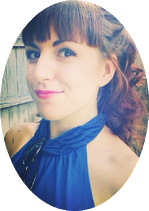 Christina Korpik, Class of 2015
Christina Korpik, Class of 2015
Why do you want to be an acupuncturist?
I want to be an acupuncturist because I am a firm believer in the magic and supremacy of natural medicine’s capacities to treat health imbalances and disease, as well as provide preventive care. Acupuncture helped to transform my own life and health when I was suffering, whereas Western medicine only worsened my conditions. I am fascinated specifically by acupuncture’s ability to trigger homeostasis and instill positive physical change in the body and one’s state of mind, as well as instantly boost an individual’s level of peacefulness with minimal to no side effects. I wanted to become a part of this magical treatment modality and art form that effortlessly taps into the body’s energetic and physical makeup in such a profound way, all the while using the elements of nature systematically as a guide in ways which reinforce the inherent connectedness of all things.
I deeply resonate with the belief that our emotional and spiritual makeup always directly impacts our current state of health and wellbeing, or lack thereof, at any given moment. One of the powers of Chinese medicine as a healthcare modality is its synergy – its ability to combine and use a great variety of diagnostic and treatment tools and modalities in order to treat the totality of a patient’s physical, emotional, spiritual, environmental, societal, and mental health. Western medicine does not have this ability or power. I believe there is a need for “TRUE” multi-faceted healthcare providers in this country who are capable of offering patients care on these levels, all the while treating them as PEOPLE with diverse needs and circumstances, as opposed to simply another case of (fill in the blank) to toss pharmaceutical drugs or invasive procedures at.
Why did you choose AOMA?
For years leading up to my decision to become a practitioner of Chinese medicine, I had been hearing stories from trusted friends and colleagues of AOMA’s overall prestige and excellence. I had heard countless beautiful accounts of the experienced, talented, and professional staff, practitioners, and professors at AOMA, as well as the incredible and unique student body. One thing that stuck out was constantly hearing of how dedicated EVERYONE – staff and students alike – in the AOMA community was to truly being a reliable and high-quality source of compassion and healing for the greater community.
If I hadn’t already been sold by the reputation of the school and the knowledge of its premier and famous herbal program, I was quickly convinced of the necessity of my attending the graduate program when I realized that the Chinese medicine practitioners who had personally salvaged my own health after many years of unsuccessful treatment from Western medicine had both graduated from AOMA.
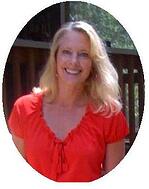 Diana Slivinski, Class of 2014
Diana Slivinski, Class of 2014
Why do you want to be an acupuncturist?
A year in Taiwan studying Mandarin Chinese began my path of Asian studies. My first visit to an acupuncturist, a Buddhist monk, left me feeling wonderful…..in body, mind, and spirit. I loved the well-rounded approach to maintaining health and well-being. The study of acupuncture and oriental medicine is proving to me that I have chosen the right path.
Why AOMA?
I chose AOMA after looking into several schools because their class schedule and offerings seemed well thought out and organized. The teaching staff at AOMA is a talented group of scholars from China and abroad. AOMA offered me what I needed to pursue a new career.
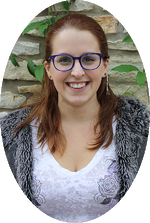 Jessica Johnson, Class of 2017
Jessica Johnson, Class of 2017
Why do you want to be an acupuncturist?
I am fully committed to what looks like will be three years of intense study, and already I can see that sometimes it is more difficult than it is fun to be a student of acupuncture. Anyone who enters the program knows that it is not always easy. But I will never stop trying to become an acupuncturist because I have seen how rewarding it is to help those who thought there was no help for them. I have been the person who thought I would always be sick, no matter how many medications I was on. Becoming an acupuncturist is not just a livelihood; it is a commitment to care, to love. Those of us who aspire to be acupuncturists realize that we can transform the lives of our patients, and we know that to be valued by those in your care is a true blessing.
Why did you choose AOMA?
Originally, I chose to enroll at AOMA because I knew they had one of the best programs to become an acupuncturist. I knew that they were committed to ensuring a quality education for their students. However, I came to find that AOMA is not just a school. The people you come to know – students, faculty, and teachers – they become your family. They encourage you to ask questions. They support you. They take care of you to the best of their ability. I have found that within AOMA there are students and faculty alike who would help you with anything if you asked. I have only been at the school for a short time but I can already name so many people who I can honestly say have changed my life. Yes, I enrolled because I believe the school and program are the best in the State of Texas, but I stayed because of the people I have come to know here.
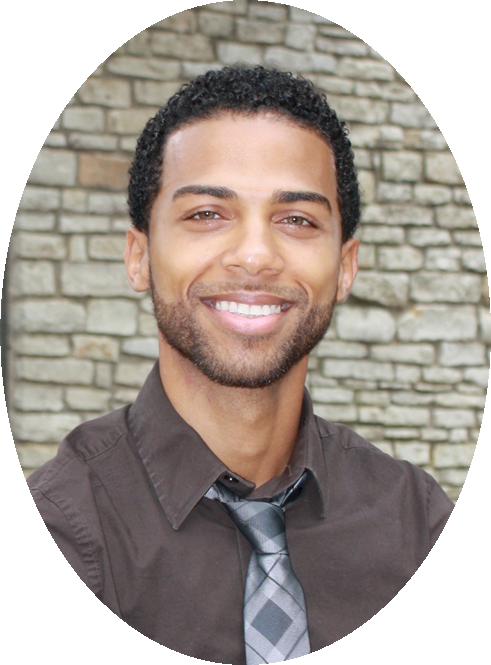 Loubriel Sosa, Class of 2014
Loubriel Sosa, Class of 2014
Why do you want to be an acupuncturist?
We walk through life exploring ourselves; each and every situation reveals a unique expression. As we grow, we assume responsibility over our destiny. Some search and search, and never find their calling. Being an acupuncturist fulfills me and nourishes my being. I want to be an acupuncturist because it calls to me. To experience the joys of healing and to perpetuate the art of love is my destiny.
Why did you choose AOMA?
At first I chose AOMA because of its reputation, but now that I've been a student of this wonderful institution for some time, I recognize that AOMA was the only road for me. It provided me with purpose and direction.
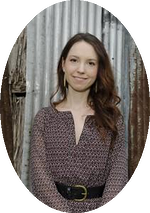 Abigail Karp, Class of 2013
Abigail Karp, Class of 2013
Why do you want to be an acupuncturist?
I want to become an acupuncturist because I was inspired by the amazing acupuncturists and herbalists in my life who helped me regain my own wellness after dealing with complications from Celiac disease. After volunteering at a local community acupuncture clinic, I saw how this gentle and peaceful way of healing was making such a huge improvement in the quality of life for many different kinds of people.
Why did you choose AOMA?
I chose AOMA because I was so impressed by the enthusiasm and the sense of community the school fosters among students and faculty. Austin is such a vibrant city, and I feel that AOMA is a vibrant acupuncture school! I appreciate the ways that it is changing and evolving to meet the needs of the students and patients it serves.
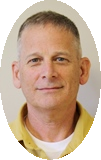 Michael Callaghan, Class of 2017
Michael Callaghan, Class of 2017
Why do you want to be an acupuncturist?
I really don’t want to be an acupuncturist – I want to be a practitioner of Oriental medicine, which includes acupuncture. My goal of becoming a practitioner of TCM is to give back to a community of people, the Armed Forces, who need an alternative to traditional Western medicine. As a veteran, I experienced military medicine, which is normally focused at putting the soldier, sailor, airman, or marine back to work and not effectively treating the causes of the illness or injury. I believe that TCM offers an alternative to taking medications which cover the overall symptoms; instead, TCM treats the symptoms for long-term beneficial health gains. If I can help just a small percentage of the active, reserve, or formerly active-duty community by providing comprehensive care through the principles of TCM, I will have accomplished my goal.
Why did I choose AOMA?
While there are many choices, AOMA offers an integrative approach, which I believe is key to future success. AOMA has a great success rate academically, which it is reflected in the high percentage of its graduates who find employment immediately after completion of the program. Lastly, the staff and faculty of the school treat everyone as individuals and are supportive in assisting you to obtain your goals.
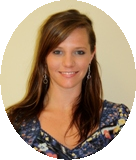 Elizabeth Arris, Class of 2015
Elizabeth Arris, Class of 2015
Why do you want to be an acupunct
urist?
For so many reasons! Being an acupuncturist is a career that offers many opportunities every day to support another person in feeling well. I enjoy holding space for patients to be mindful of their physical sensations and emotional experiences, which are so often ignored during busy lives. When patients share their pains, discomforts, and vulnerabilities with me, I feel honored to be a guardian of that information and am grateful for the chance to practice using the power of my position and education in a way that is appropriate, heart-centered, and helpful. Perhaps most of all, I love being part of a health-conscious community of healers where my personal wellbeing is valued as much as my productivity.
Why did you choose AOMA?
I think a degree from AOMA Graduate School of Integrative Medicine (AOMA) keeps many doors open: AOMA is regionally accredited, meaning their credits may transfer to other non-TCM schools (which is uncommon); and
AOMA grads have the option to apply for a California license (which is also uncommon for acupuncture schools outside of California). Additionally, AOMA is committed to continued development of the clinical training and biomedical components of its curriculum, providing students the tools necessary to feel comfortable in both integrative medicine environments and TCM environments.
Over the past three years at AOMA, I have also grown to appreciate other aspects of the school, particularly the strength of the herbal program and the warmth of the Qigong community. As a lifelong dancer, my passion for movement evolved naturally into a love for the graceful, purposeful Sheng Zhen Qigong form featured at AOMA. Although Sheng Zhen’s Master Li was not a primary factor in my choosing AOMA, I’ve come to view him as one of AOMA’s treasures and one of my anchors within the AOMA community.



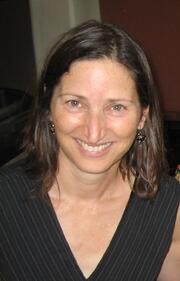 For
For 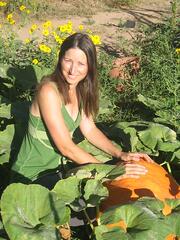 Pamela describes her path to AOMA as “intuitive and visceral.” After she completed her master’s degree program in New Mexico, she enrolled in two year-long continuing education programs. However, something wasn’t right about the decision.
Pamela describes her path to AOMA as “intuitive and visceral.” After she completed her master’s degree program in New Mexico, she enrolled in two year-long continuing education programs. However, something wasn’t right about the decision.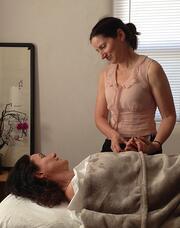 A couple of months later, Pamela started studying pulse diagnosis with Dr. William Morris. When she asked him about AOMA’s new doctoral program, he said, “The first cohort starts on Wednesday. What do you want to know?” and she felt that moment of recognition, an inexorable pull of destiny, that the path of her life would now shift in an unexpected yet welcome way. She expects to graduate from AOMA’s doctoral program in 2015. Her initial research topic – How Chinese Medicine Can Intervene in Multigenerational Trauma – is changing her practice.
A couple of months later, Pamela started studying pulse diagnosis with Dr. William Morris. When she asked him about AOMA’s new doctoral program, he said, “The first cohort starts on Wednesday. What do you want to know?” and she felt that moment of recognition, an inexorable pull of destiny, that the path of her life would now shift in an unexpected yet welcome way. She expects to graduate from AOMA’s doctoral program in 2015. Her initial research topic – How Chinese Medicine Can Intervene in Multigenerational Trauma – is changing her practice.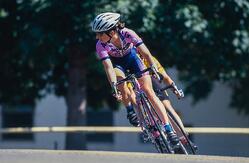 Outside of AOMA, Pamela has a new practice at her own clinic,
Outside of AOMA, Pamela has a new practice at her own clinic, 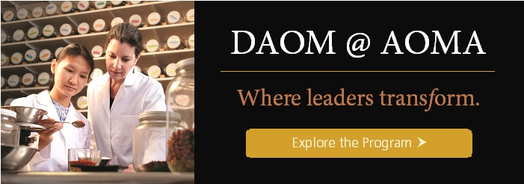
 About Kate Wetzel:
About Kate Wetzel:
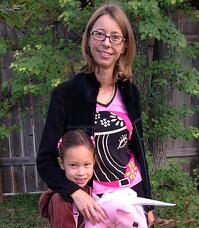 Isabelle Chen-Angliker, a pediatrician from Switzerland, was never fully satisfied with the Western medical approach. She did not agree with the method of funneling patients into an increasingly sub-specialized medical system. She was concerned with the discrepancy of more sophisticated diagnostics vs. the lack of treatment options that are both minimally invasive and without significant side effects.
Isabelle Chen-Angliker, a pediatrician from Switzerland, was never fully satisfied with the Western medical approach. She did not agree with the method of funneling patients into an increasingly sub-specialized medical system. She was concerned with the discrepancy of more sophisticated diagnostics vs. the lack of treatment options that are both minimally invasive and without significant side effects. 

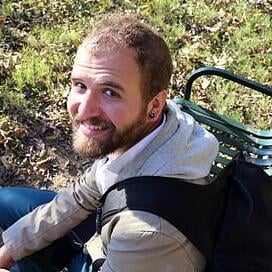
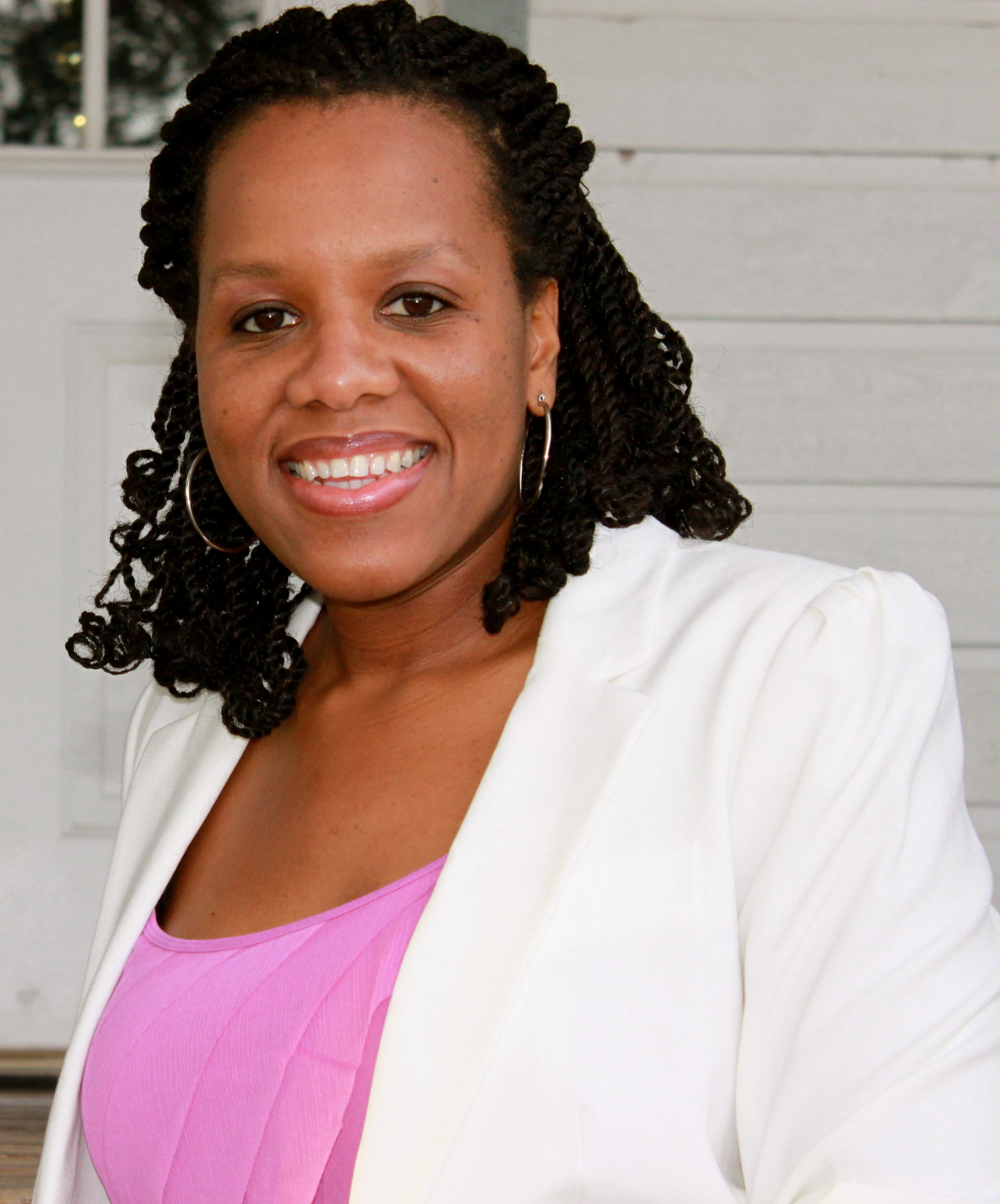 AOMA student Blake Gordon is known on campus for her infectious smile and her extensive knowledge of naturopathic medicine.
AOMA student Blake Gordon is known on campus for her infectious smile and her extensive knowledge of naturopathic medicine.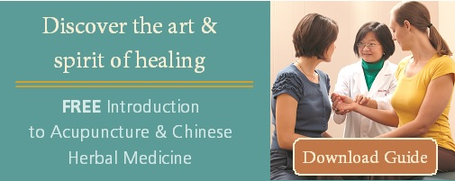
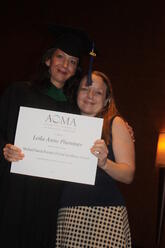 At the 2013 commencement ceremony on September 15th, AOMA student Leila Plummer was recipient of the Michael Garcia Prendes Herbal Excellence Award. Since 2006 this honor has been bestowed upon a student who excels in the study of herbal medicine. The recipient is chosen by the previous year’s beneficiary, as someone who strives for superior herbal knowledge and shares the love of learning herbs with fellow students.
At the 2013 commencement ceremony on September 15th, AOMA student Leila Plummer was recipient of the Michael Garcia Prendes Herbal Excellence Award. Since 2006 this honor has been bestowed upon a student who excels in the study of herbal medicine. The recipient is chosen by the previous year’s beneficiary, as someone who strives for superior herbal knowledge and shares the love of learning herbs with fellow students.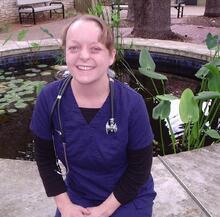
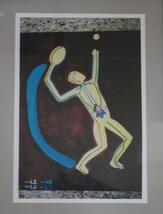 Michael Garcia Prendes contracted a terminal illness and died before he could graduate. AOMA framed a beautiful print that Michael painted of a tennis player (with acupuncture meridians) about to serve a ball. Michael painted the piece for Pam Ferguson’s shiatsu class. The print hangs in the student lounge with the sentiment that suits Michael’s character: “Be present and focus, Lift up and Serve.”
Michael Garcia Prendes contracted a terminal illness and died before he could graduate. AOMA framed a beautiful print that Michael painted of a tennis player (with acupuncture meridians) about to serve a ball. Michael painted the piece for Pam Ferguson’s shiatsu class. The print hangs in the student lounge with the sentiment that suits Michael’s character: “Be present and focus, Lift up and Serve.”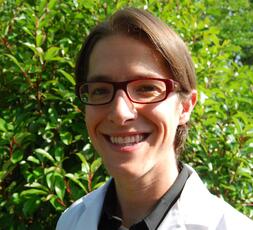 Bryan Ellett, MAOM, L.Ac.
Bryan Ellett, MAOM, L.Ac.
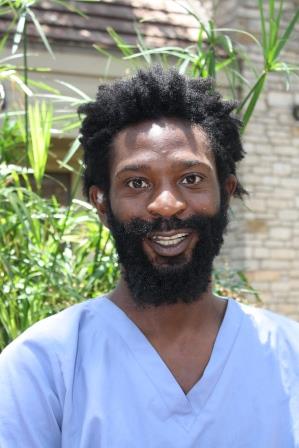 AOMA student, Gregory King can usually be found by his resounding laughter echoing in the hallway. Greg comes from Louisville, Kentucky where he discovered martial arts. During the first year of the program at AOMA he was working as a mentor for inner city youth. His case load included children who struggled with suicidal motives, depression, gang violence, and social isolation. Greg says, “I am grateful for the learning of the experience but it was extremely difficult. I overcame by really taking myself to the mat.” He began collaborating with world renowned martial artist Tom Callos and joined Ultimate Black Belt Team. Greg says, “This simple practice gave me a focus on becoming stronger because I was feeling the weakest and most vulnerable I have ever felt in my entire life.”
AOMA student, Gregory King can usually be found by his resounding laughter echoing in the hallway. Greg comes from Louisville, Kentucky where he discovered martial arts. During the first year of the program at AOMA he was working as a mentor for inner city youth. His case load included children who struggled with suicidal motives, depression, gang violence, and social isolation. Greg says, “I am grateful for the learning of the experience but it was extremely difficult. I overcame by really taking myself to the mat.” He began collaborating with world renowned martial artist Tom Callos and joined Ultimate Black Belt Team. Greg says, “This simple practice gave me a focus on becoming stronger because I was feeling the weakest and most vulnerable I have ever felt in my entire life.”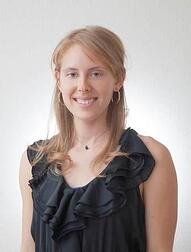 Elaina Stover received a $2,000 scholarship from Trudy McAlister Foundation for her acupuncture program studies at AOMA Graduate School of Integrative Medicine, one of the leading graduate schools of acupuncture and Chinese medicine in the nation.
Elaina Stover received a $2,000 scholarship from Trudy McAlister Foundation for her acupuncture program studies at AOMA Graduate School of Integrative Medicine, one of the leading graduate schools of acupuncture and Chinese medicine in the nation.